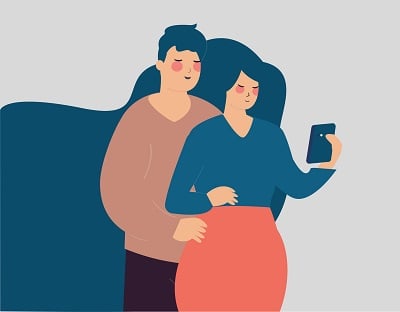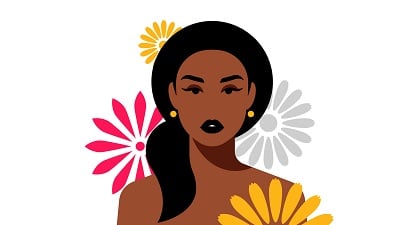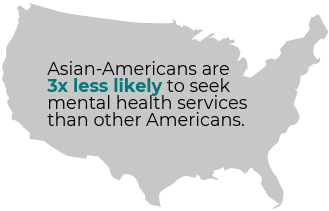ADAA recognizes that the Asian American and Pacific Islander (AAPI) community incorporates a broad variety of ethnicities, identities and cultures. The Asian American community can include roots from over 20 countries in East and Southeast Asia and the Indian subcontinent, while Pacific Islanders (also known as Native Hawaiians and Pacific Islanders—NHPI), encompasses communities with people of Polynesia (Native Hawaiians), Micronesia, Melanesia and even Samoa (Samoans) decent. Both Asian Americans and Pacific Islanders deal with themes of trauma, stress, and historical stigmas stemming from cultural traditions. In order to continue our commitment to inclusion and promote the importance of identity, ADAA wants to use this page and its resources to highlight the unique mental health challenges faced by both of these communities. Find out how to share your story with ADAA.
- Understanding Mental Health Barriers
- The Silence in Asian American Communities
- Stigmas within the NHPI Communities
- Choosing the Right Provider
- Additional Resources from the ADAA Community
- Trending Articles
Understanding Mental Health Barriers
It is estimated that there are approximately 22.9 million Asian/Pacific Americans living in the U.S., including those with a combination of Asian Pacific Heritage and another race. Of this population, 2.9 million are living with mental health conditions.1 There are several barriers to this population seeking help from mental health professionals, including language barriers,2 stigmas, and a lack of awareness of resources and mental health services.

The Silence in Asian American Communities
Because of cultural norms, silence is one of the most common barriers in Asian American communities. Even though the community often deals with racial trauma and the stress that comes with attempting to uphold traditions as first-generation immigrants, studies show that Asian Americans are three times less likely than their White counterparts to seek treatment for their mental health concerns. In addition, they also avoid seeking treatment or utilizing mental health services because doing so would admit the existence of a mental health disorder, and in turn, might bring shame to their family's name. The impact of silence comes with the fear of shame and continues to cripple and hinder the mental health progress of the community. However, as more members of the community learn how powerful and courageous it is to speak out about and seek care for their mental health, more members will begin to dispel the stigmas and find the benefits of mental health care.
Stigmas within the Pacific Islanders (NHPI) Communities
Studies have shown that Native Hawaiians and Pacific Islanders (NHPI) can deal with a heavy burden of depression, anxiety, and alcohol use, with a high perceived need for services.4 However, there is a cultural stigma that less frequently perceives mental health disorders as serious, which instead more commonly promotes social distance from people with depression.5 Ultimately, these negative stigmas can continue to enforce low levels of help-seeking from the community. With this understanding, destigmatizing mental health within the NHPI community should include intentional culturally responsible interventions and awareness programs that acknowledge and highlight sociocultural and socioeconomic experiences as a public health priority.
Choosing the Right Provider

As both communities find it difficult to discuss mental health care, it is important to find a provider who demonstrates an understanding of the cultural norms and needs of their community. Finding a provider that showcases cultural competence—their ability to give care to patients with diverse values, beliefs, and behaviors, and to consider their social, cultural, and linguistic needs3—is essential in being able to relate to the patient and providing beneficial help.
When searching or meeting a provider, it is important to ask questions to get a sense of their level of cultural sensitivity and whether they have treated other Asian-Americans or NHPIs, and how they plan to take your beliefs and practices into account when suggesting treatment.
Below is a list of therapists and mental health resources for both the AAPI and NHPI communities.
Providers for Asian American Communities
- South Asian Therapist
- Asians for Mental Health Directory
- Asian Mental Health Collective:
- National Asian American Pacific Islander Mental Health Association- Service Providers Directory
- Asian Mental Health Coalition
- BIPOC therapists
For Pacific Islander Communities
- Inclusive Therapist- Pacific Islanders
- Ho’ola Lahui Hawaii- Providers
- Find a Therapist- Hawaii
- BIPOC therapists
Learn more about finding the right therapist.

Additional Support and Resources from the ADAA Community
These ADAA resources—blog posts, webinars, articles, and stories—provide helpful information, support, and opportunities to learn more about mental health within AAPI communities.
ADAA Member Blog Posts, Webinars, and Media Resources
- Instagram Live Community Conversation about Stigma in the AAPI Community, Tanaya Kollipara and Tiara Johnson
- The Stigma Surrounding AAPI Mental Health, ADAA Story of Triumph, Tanaya Kollipara
- Too Well-Off to Seek Help?: The Model Minority Myth of Asian Americans, ADAA blog post by Dahyeon Kim
- Persistent Trauma of Systemic Racial Inequities and the Perils of COVID-19, ADAA blog post by Kathariya Mokrue, PhD; Mbemba Jabbi, PhD
- Responding to Anti-Asian Racism During the COVID-19 Outbreak, ADAA blog post by Bryan Balvaneda; Lizabeth Roemer, PhD; Sarah Hayes Skelton, PhD; Amelia Yang; Anna Ying
Infographics
Personal Stories:
- This Is Why, Bryan Jung
- The Stigma Surrounding API Mental Health, Tanaya Kollipara
Trending Articles
2023
- After a traumatic year, Asian Americans make healing a family matter. Here’s how they’re talking about mental health across generations, CNN
- How to help Asian American seniors affected by the mass shootings, Los Angeles Times
- When a crisis strikes, how do you cope? | AAPI Mental Health Resources
2022
- How some therapists are helping patients heal by tackling structural racism, NPR
- Asian Pacific Islander Mental Health, Psych Central, 2022
- Asian Women Continue to Face Terrifying Attacks in the U.S. What Advocates Say Need to Change, USA Today, Feb 2022
- Improving Asian American Health During the Syndemic of COVID-19 and Racism, eClinical Medicine, Feb 2022
- Racism Linked to Drinking Problems in Asian American Students, New Study Shows, NBC News, March 2022
- She’s Combatting a Wave of Anti-Asian Hate, NYT, March 2022
- Strengthening Mental Health Services in the Pacific during COVID-19 and Beyond, World Health Organization, Feb 2022
- Supporting Asian American and Pacific Islander Students, Newswise.com, Feb 2022
- How To Find A Therapist Who Focuses On Asian American Mental Health, HuffPost, February 2022
2020-2021
- A Collective Trauma: Asian Americans Confront Mental Health Crisis Amid Rise of Racist Attacks, USA Today, June 2021
- During pandemic, racism puts additional stress on Asian Americans, ScienceDaily.com, 2020
- Its Hard to Search for a Therapist of Color: These Website Want to Change That, NYTimes.com, July 2021
- People of Color Face Significant Barriers to Mental Health Services, CNN, 2020
- The Anxiety of Growing up Asian American, TheCut.com, May 2021
Additional Resources
- Asian Americans Are Undergoing a Silent Mental Health Crisis
- Asian American with Disability Initiative
- Asian American Health Initiative (AAHI)
- Asian Pacific Community in Action
- Asian Pacific Institute on Gender Based Violence
- Asian Pride Project
- Asian American Psychological Association (AAPA)
- Asian & Pacific Islander American Health Forum (APIAHF)
- Asian Mental Health Collective
- Chinese-American Sunshine House
- Coming Out Living Authentically as a LGBTQ+ Asian Pacific Islander Americans
- Each Mind Matters
- Hiding my Mental Illness From My Asian Family Almost Killed Me
- Mustard Seed Generation
- Mental Health Association for Chinese Communities
- National Asian American Pacific Islander Mental Health Association (NAAPIMHA)
- A New Generation Of Therapists Is Fighting Asian-American Mental Health Stigma
- Racial Discrimination Has Different Mental Health Effects on Asians Depending on Ethnic Identity, Age and Birthplace, Study Shows, APA.org
- Shedding Light on Asian American and Asian Students’ Mental Health Needs
- Stop AAPI Hate
- Talking About Depression Can Be Hard for Asian Americans, But Services Can Help
- We're Fine: What's Stopping Asian-American Millennials From Talking About Mental Health
- What It's Like to be Asian-American with Depression
- Why Asian-Americans And Pacific Islanders Don’t Go To Therapy
- Viet Care
References:
- file:///Users/tiaraj./Desktop/2022-BIPOC-MHM-Toolkit.pdf
- Asian American/Pacific Islander Communities and Mental Health, MHA
- Mental Health Among Asian-Americans, APA
- Becoming a Culturally Competent Health Care Organization, AHA
- https://pubmed.ncbi.nlm.nih.gov/30991907/
- https://pubmed.ncbi.nlm.nih.gov/30716597/













